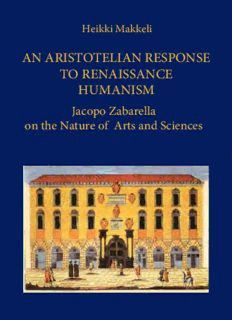
An Aristotelian response to Renaissance humanism: Jacopo Zabarella on the nature of arts and sciences PDF
Preview An Aristotelian response to Renaissance humanism: Jacopo Zabarella on the nature of arts and sciences
Heikki Makkeli AN ARISTOTELIAN RESPONSE TO RENAISSANCE HUMANISM Jacopo Zabarella on the Nature of Arts and Sciences Heikki Mikkeli An Aristotelian Response to Renaissance Humanism: Jacopo Zabarella on the Nature of Arts and Sciences Societas Historica Finlandiae Suomen Historiallinen Seura Finska Historiska Samfundet Studia Historica 41 Heikki Mikkeli An Aristotelian Response to Renaissance Humanism: J acopo Zabarella on the Nature of Arts and Sciences - - - - - - - SHS/Helsinki/1992 Cover: Rauno Enden Painting: Main entrance of the University of Padua (Palazzo del Bo). Engraving from the 17th century. Published in "I secoll d'oro della Medicina" 1986. The Finnish Historical Society has published this study with the permission, granted on 24 March 1992, of Helsinki University, Faculty of Arts. Keywords: History of Science - Renaissance Aristotelianism - Jacopo Zabarella ISSN 0081-6493 ISBN 951-8915-58-X Gummerus Ki:japaino Oy Jyvaskyla 1992 Contents ACKNOWLEDGMENTS ........................................ ..................... 7 1. INTRODUCTION................................................................... 9 1.1. Humanism and science ................................................. 9 1.2. Aristotelianism at Padua............................................... 12 1.3. The nature of arts and sciences .................................... 14 1.4. Jacopo Zabarella: his life and works............................. 18 2. ARTS AND SCIENCES IN ZABARELLA'S THOUGHT ....... 21 2.1. Aristotle on arts and sciences....................................... 21 2.2. Contemplative sciences and productive arts............... 25 2.3. The primacy of theoretical sciences ............................. 30 2.4. Putting sciences 4J. order............................................... 35 2.5. The perfection of natural philosophy........................... 40 3. LOGIC AS AN INSTRUMENT OF SCIENCE ........................ 45 3.1. The nature of logic ........................................................ 45 3.2. The use of logic ............................................................. 50 3.3. Rhetoric and poetry as logical disciplines................... 59 3.4. Poetry and moral instruction........................................ 67 4. THE METHODOLOGY 8F ARTS AND SCIENCES.............. 80 4.1. Orders of presentation................................................... 80 4.2. Methods of demonstration............................................ 85 4.3. Induction and the regress-method................................ 92 4.4. Sense-perception and reasoning ................................... 101 5 5. ART AND NATURE IN THE ARISTOTELIAN TRADITION ............................................................................ 107 5.1. Aristotelian tradition: art imitates nature ............... ~ .... 107 5.2. A Renaissance dilemma: can an art compete with nature? ........................................................................... 111 5.3. Mechanics: a mediator between art and nature ........... 119 6. THE MEDICAL TRADITION AT THE UNIVERSITY OF PADUA ..... : ............................................................. , .............. 131 6.1. From Pietro d'Abano to Leoniceno's medical humanism ...................................................................... 131 6.2. The nature of medical knowledge: art or science? ....... 135 6.3. Anatomy as the basis of medical science ..................... 148 6.4. Zabarella's response to medical humanism ................. 159 7. ARTS AND.SCIENCES AT PADUA IN THE SIXTEENTH CENTURY .............................................................................. 178 ABBREVIATIONS ....................................................................... 182 BIBLIOGRAPHY ......................................................................... 183 INDEX OF NAMES ..................................................................... 195 6 Acknowledgments Many individuals and several institutions have helped me on my way. First of all, I would like to thank Professor Simo Knuuttila who encouraged me to study Renaissance Aristotelianism. Without his generosity in sharing his learning I would not have been able to accomplish my task. I am also grateful for his comments on a manuscript of this book. I would also like to thank all those at the History Department of the University of Helsinki who provided me with assistance and advice, especially Professors An.to Leikola, Pfilvi Setfila and Pekka Suvanto. During the years 1986-1987 I worked for a project lead by Associate Professor Matti Viikari, who as my adviser has constantly given me valuable criticism. In 1988-1990 I had the priviledge to hold the post of research associate of the Academy of Finland and I am grateful to the Research Council for the Humanities for their confidence. During the last five years the Renvall Institute of Historical Research has kindly provided me with working facilities. I would also like to thank Jenny and Antti Wihuri Foundation, Vfilno Tanner Foundation and Finnish Cultural Fund (Pfilvi Priha Foundation) for-their financial support. The staffs of various. institutes and libraries in Italy and elsewhere have promptly helped me in my studies. In particular I wish to thank the staff of Villa Lante, the Finnish Institute in Rome, and the staff of the Helsinki University Library whose kind attitude made it a memorable pleasure to deal with them. I would also like to express my gratitude to the Finnish Historical Society for giving the permission to print this study in their series, and especially to Rauno Enden, for bringing it into its final published form. 7 The English language of this thesis was painstakingly corrected by Gillian Day, MA. Due to later additions and changes, I can claim sole responsibility for those weaknesses and errors which.remain. It is impossible to name all friends who have helped me in the long process of making this study. However, during the last few years the help of Markku Pelton.en, Kari Saastamoinen and Ilkka Turunen has been particularly valuable. Finally, 1 would like to mention those nearest to me. My mother Anna-Liisa and my late father Mikko taught me to love learning and I am grateful for their encouragement and generosity. However, my greatest debt is to my family. My wife Jaana Iso Markku and our children, Antti and Outi, provided companionship I needed to see me through a project that at times seemed boundless. Helsinki, on Easter Monday 1992 8
Description: